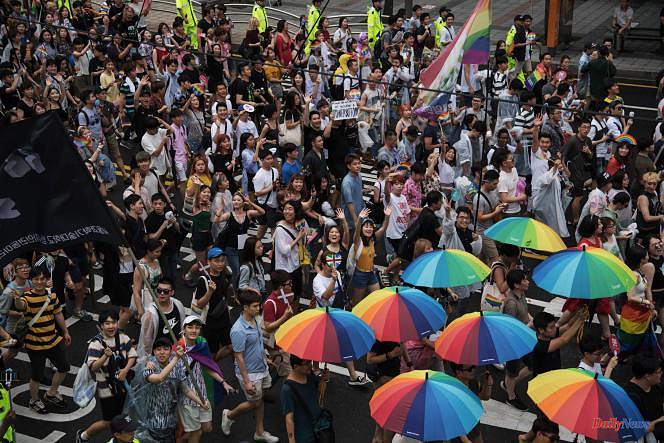Just a year ago, the hopes of LGBT couples in South Korea of finally accessing some form of recognition were dwindling. But a ruling by the Seoul High Court set a precedent, leading to a proposed law. Jang Hye-young, MP for the Justice Party, brought to Parliament on Wednesday, May 31, a text in favor of same-sex marriage. A historic first that defenders of sexual minorities welcome, in a context where the powerful conservative fringe of South Korean society still opposes them with "real hostility", in the words of the organization Human Rights Watch.
Two men, So Seong-wook and Kim Yong-min, symbolically married in 2019 in a ceremony with no legal validity. They live together as a married couple. Mr So then registers his partner as a dependent with the country's public health insurance service, the National Health Insurance Service (NHIS). Eight months later, Mr Kim's status was revoked after the NHIS discovered that Mr So and Mr Kim were a same-sex couple.
In 2021, Mr. So sued the institution after the cessation of benefits from which his partner benefited. The Seoul Administrative Court rejects his request and agrees with the NHIS in 2022: "According to the law, the court then argues, the union of a man and a woman is understood as the fundamental element of marriage and there is no legal reason to extend this definition to same-sex couples. »
Discrimination based on sexual orientation
Major reversal: In February 2023, the Seoul High Court reversed this decision, ordering the health insurance service to restore Mr. Kim's benefits. The judges recalled that Social Security legislation allows married couples to register with one of the members dependent on the other. They also considered that the exemption of same-sex couples can be seen as discrimination based on sexual orientation.
“The Complainant and his partner are men, but they see each other as loving partners caring for each other. One is financially dependent on the other. They declared their union in front of their families and friends. Their relationship is therefore no different, in its essence, from that of a married couple", concludes the Court's judgment, which specifies however that, if this decision is a first in South Korea, it is not is in no way an acknowledgment of the "legal status" of same-sex marriage.
A "decision [which] gives hope that it is possible to overcome prejudice", commented Boram Jang, East Asia researcher at Amnesty International. However, "there is still a long way to go to end discrimination against the LGBT community," she insisted.
"Deeply patriarchal system"
On several occasions, the Korean Democratic Party has proposed laws aimed at combating discrimination against sexual minorities. Debated, none of them were ever adopted, the influential evangelical churches campaigning to prevent access to rights such as marriage to the LGBT community.
Politically supporting the legal union between two people of the same sex was therefore never considered. In fact, nothing prohibits it, but nothing allows it either, and it is not recognized. In 2013, director Kim Jho Kwang-soo himself dreamed of a big wedding with his companion. The union took place, but it remained symbolic.
The Korea Herald reported a month ago that the Korean Constitution "does not mention same-sex marriage by name", but Article 36 referring to marriage "has traditionally been interpreted to mean that a marriage must involve persons of opposite".
The presentation of a text in favor of same-sex marriage in the South Korean Parliament is therefore a first, welcomed the Justice Party. This amendment is part of a bill aimed at expanding the right to found a family, defending, moreover, medically assisted procreation for single women – but not for female couples. "One more step towards severing the deeply patriarchal system of marriage as well as the family and towards changing the institutions, practices and culture of our society (...) in a more egalitarian direction", rejoiced the Equal Marriage Association in Korea.
This new law proposes that the union be based "on the request of both parties of the opposite sex or of the same sex, in order to correct the fact that the marriage requests of same-sex couples have not been accepted so far. because of the customary discrimination that exists in our society,” says MP Jang Hye-young.
The elected member of the Justice Party defends in this same bill a "birth assistance" for single women wishing to resort to medically assisted procreation, regardless of their marital status. As for the recognition of the social mother in a couple of women (the one who does not carry the child), no details have been provided. The MP is also proposing legislation allowing two unmarried adults to legally arrange to live together to "enjoy the legal rights and social support they need to live and care for each other as that family."
Supported by the Democratic Party, the People's Power Party, as well as independent lawmakers, the bill is unlikely to pass, but increases pressure on the government, gradually pushed to recognize the existence of families outside traditional models.












